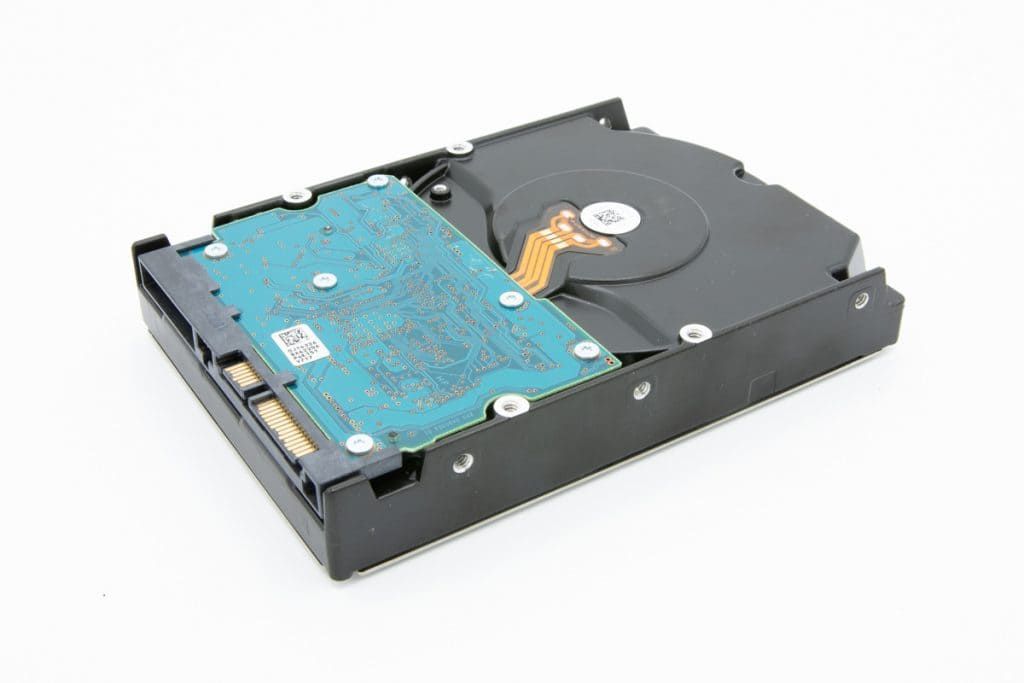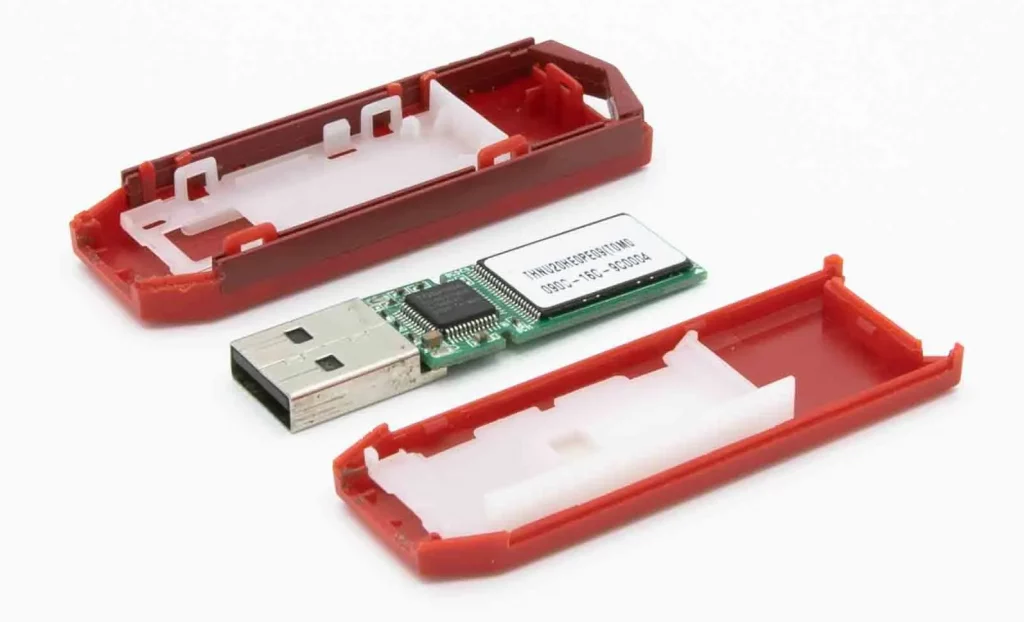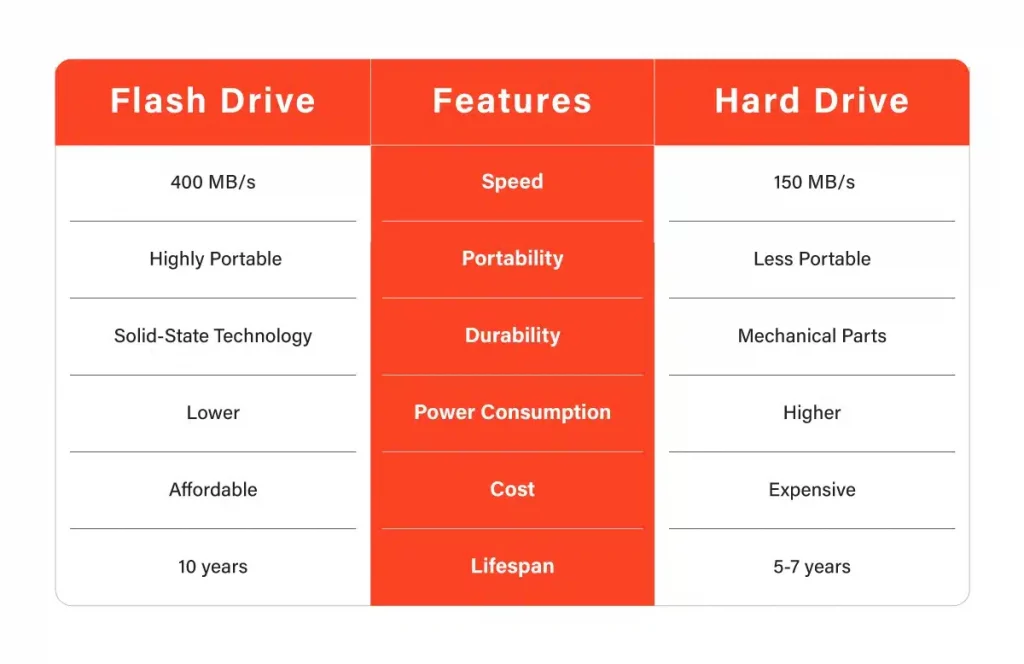Flash Drive vs Hard Drive encapsulates the ongoing debate between the portability and speed of flash drives and the superior storage capacity and longevity of hard drives in modern digital storage solutions. Each option has advantages and specific use cases, making them suitable for different needs.
Hard drives are typically utilized for storing large amounts of data within computers, while flash drives, also known as USB sticks, serve as portable storage devices for transferring data between different devices. Understanding the distinctions between these flash drives and hard drives can aid in determining the most suitable choice for your storage requirements.
What is a Hard Disk Drive
A Hard Disk Drive (HDD) is a conventional computer storage device. It serves as an electromechanical data storage device that employs magnetic storage to store and recover digital data utilizing one or more rigid, rapidly turning disks or platters coated with magnetic material.
A hard disk drive design incorporates a set of stacked “disks,” each equipped with a read-write head on an arm that accesses the data while the disks are in motion.
The key attributes of HDDs include their substantial storage capacity and cost-effectiveness per gigabyte. These drives can store multiple terabytes of data on a single device, making them well-suited for housing operating systems, software, and large files.

Another noteworthy aspect is their longevity, as they typically endure regular use for several years. However, their mechanical nature can make them susceptible to physical damage and data loss, and they may operate slower than solid-state storage solutions.
What is a Flash Drive
A Flash Drive, often called a USB stick or thumb drive, is a compact, portable storage device. It uses flash memory for data storage, allowing seamless transfer between devices.

Unlike a hard disk drive, a flash drive has no moving parts, making it less susceptible to physical damage and data loss from mechanical failure.
Flash drives are widely known for their portability and convenience. These small and portable devices fit easily on a keychain or pocket. They can connect to almost any device with a USB port. It makes them perfect for transferring files between different devices or locations.
Moreover, USB drives offer speedy data transfer, especially with smaller file sizes. However, it is important to note that they generally provide less storage capacity than hard drives. Although durable, their lifespan may be shorter, particularly with heavy usage due to the finite number of flash memory cycles.
Flash Drive vs Hard Drive Difference
Flash Drive vs. Hard Drive Difference is an integral aspect to consider when choosing your storage medium; it ultimately hinges upon your unique needs, whether the portability and speed offered by flash drives or the larger storage capacity and better data recovery choices provided by hard disk drives. These considerations highlight the distinctions between the two storage options.
Dimensions
When comparing the size difference between hard disks vs flash drives, USB drives emerge as the clear winner. USB drives are compact and weightless, making them easily portable in a pocket or keychain. On the other hand, hard disk drives are substantially larger and heavier, which limits their portability.
Performance
Regarding performance, particularly speed, comparing hard and USB drives tends to favor the latter. USB drives swiftly read and write data, making them perfect for transferring small to medium-sized files. On the other hand, hard drives operate slower due to their mechanical nature.
Price
When comparing flash drive vs external hard drive, it’s important to consider the affordability factor. Flash drives are frequently cheaper because of their small size and lower production expenses. Conversely, hard drives offer greater storage capacities, allowing for increased speed, extended warranty options, and expanded storage space.
Portability
Regarding the flash vs. hard drive debate, USB drives have a clear advantage in terms of portability. Their compact configuration and lack of moving parts make them easy to carry and less prone to physical damage.

Capacity and Lifespan
However, when comparing external hard drives vs flash drives, the former takes the lead regarding storage capacity. While flash drives can store up to a few gigabytes of data, external hard drives can accommodate multiple terabytes, making them suitable for storing large files or software.
The lifespan of these components can vary. Hard disk drives have the potential to last several years, whereas flash drives have a limited lifespan defined by the number of write cycles they can endure.
Data Recovery
In the event of data loss, hard drives often provide superior options for data recovery due to their mechanical design. On the other hand, data recovery can be more challenging regarding flash drives, especially once the flash memory cycles have been exhausted. Flash drive vs hard drive may offer a different level of reliability and ease in data recovery.
In conclusion, choosing between a hard disk drive (HDD) and a flash drive depends on individual needs and preferences. A flash drive is perfect if portability and speed are top priorities. However, a hard disk drive shines for extensive storage requirements and better data recovery capabilities. Data loss can occur unexpectedly in either case, and this is where PITS Global Data Recovery services come in. Having a demonstrated history of success in data retrieval, PITS Global offers dependable services, ensuring the recovery of your important data during an accident. Our service provides your data’s greatest safety and confidentiality, giving you peace of mind that your valuable files are securely protected. Rest assured, your important information is in trusted hands.
Frequently Asked Questions
What is the main contrast between a hard disk and a flash drive?
The main distinction lies in how they store data. A hard disk drive uses magnetic storage and moving parts to read and write data, while a flash drive uses flash memory and has no moving parts, making it more portable and less susceptible to physical damage.
Can a flash drive be used as a hard drive?
While a flash drive can function as a storage medium for files and data, it is not typically employed as a primary storage device like an internal hard drive. Flash drives are primarily used for data transportation between devices due to their portability. Nevertheless, as technology advances, high-capacity flash drives are becoming more prevalent and can serve as a suitable storage solution for specific requirements.
Is data recovery easier for hard drives or flash drives?
Due to their mechanical design, hard disk drives typically make data recovery easier. Data recovery can be more challenging for flash drives, especially after the flash memory cycles have been exhausted.
Which should I choose between a hard disk drive and a flash drive?
The choice depends on your specific needs. A flash drive may be the best choice if you need portability and speed, especially for smaller files. A hard disk drive would be more suitable if you need a large storage capacity and better data recovery options.
Is flash storage a hard drive?
Flash storage is not a hard drive. They use different methods of storing data, with flash drives using flash memory and hard drives using magnetic storage. Additionally, they have different designs and purposes, with flash drives being portable and used for data transportation.
